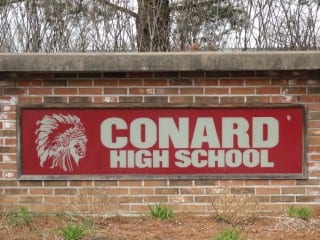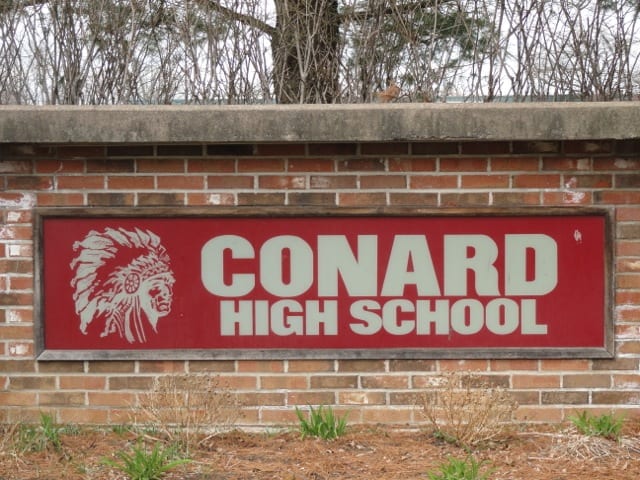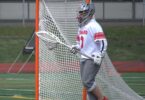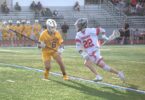By Ellen Painter Dollar
(Originally published as an op ed in the Hartford Courant, Jan. 25, 2015)

An image of a chieftain appears on the sign in front of Conard High School in West Hartford. Photo credit: Ronni Newton
As a graduate of West Hartford’s Conard High School who once clapped along with cheerleaders dressed in quasi-Native American garb and mother of a current student, I support calls to retire the school’s Chieftain mascot and name.
Schools with Native American mascots may not intend offense, but these mascots and names do offend by perpetuating inaccurate stereotypes. Their use persists despite Native American opposition. Following discussions of the Conard mascot by students and residents addressing the board of education in December, the board has scheduled a public forum on the issue at 7 p.m. on Feb. 12 in the town hall auditorium.
Conard’s logo features a Native American chief wearing a feather headdress of a type reserved for a tribe’s highest leaders and used by Great Plains tribes, not New England tribes. Misappropriating another culture’s esteemed traditions to cheer on sports teams and promote school unity doesn’t honor these traditions, as some of its defenders argue.
West Hartford’s other high school, Hall, retired its Native American logo in 2012, and Northwest Catholic retired its Indians logo and name this past year. Opponents of a similar decision for Conard fail to see the cultural misappropriation and stereotypes at the heart of efforts to retire Native American mascots.
Some who support retaining the mascot say they know people of Native American heritage who are okay with use of the Chieftain. Making the use of Native American mascots and names a matter of individual preference is not unlike prefacing an anti-Semitic slur with, “Some of my best friends are Jewish,” or arguing against abolition because some slaves are treated well. These arguments ignore clear evidence that systemic injustices have done lasting damage to generations of people and communities.
Misusing a culture’s symbols is not wrong because of how many people it bothers but because it perpetuates a dominant culture’s damaging stereotypes of a misunderstood, less powerful culture. Dozens of Native American tribes and organizations, including leaders of the nearby Golden Hill Paugussett tribe, have called for an end to Native American mascots and names.
The misuse of Native American symbols as mascots is indeed only one of many problems arising from our nation’s history of mistreating and misunderstanding native people. But addressing derogatory mascots and names helps change the discussion and illuminate other problems. From the civil rights movement, we know that more symbolic gestures (such as marches and the denouncing of ethnic slurs) work hand in hand with practical efforts (such as voter registration drives) to challenge patterns of exclusion and oppression.
Many argue that changing this cherished tradition would disappoint generations of Conard graduates. The values that Conard students and graduates treasure, however, exist separately from any mascot, logo or name. With a new name and mascot, we can still uphold the Conard traditions that really matter, including respect, hard work, dignity and leadership. Although my Conard yearbook features the Chieftain image, my pride as a Conard graduate doesn’t arise from the mascot. I am proud of being a graduate because Conard provides a top-notch education to a diverse student body, invites students to discover their talents and passions through academics and extracurricular activities, and nurtures life-changing relationships in its hallways and classrooms, on its stage and courts and fields, and in the wider community.
Retiring our schools’ Native American mascots and names is not really a matter of debate to be determined by majority opinions making a nebulous appeal to “tradition.” Retiring a Native American mascot is, instead, a choice to align ourselves with the arc of history, as we uphold the traditions of equality, justice and understanding that truly matter.
Recognizing that the Chieftain mascot fails to honor Native American people will enhance, not detract from, Conard’s tradition of teaching students what it means to be a responsible citizen of our town, the nation and the world.
[Editor’s note: To read more about this subject, please click here to read: “‘Keep the Chieftain’ Group Working with Mohegan Tribal Leaders.“]









[…] Opinion: Conard’s Native American Mascot an Insult […]
No clue how and why depiction of an Indian face is offensive. Should we protest depiction of knights, early American settlers, and pirates? If you want to be offended by something, you choose to be offended. As a Russian American, I hear misconceptions about Russian culture all the time – am I going to organize a sit-in or a protest over people’s ignorance? No, because fighting ignorance by banning something is even more ignorant.